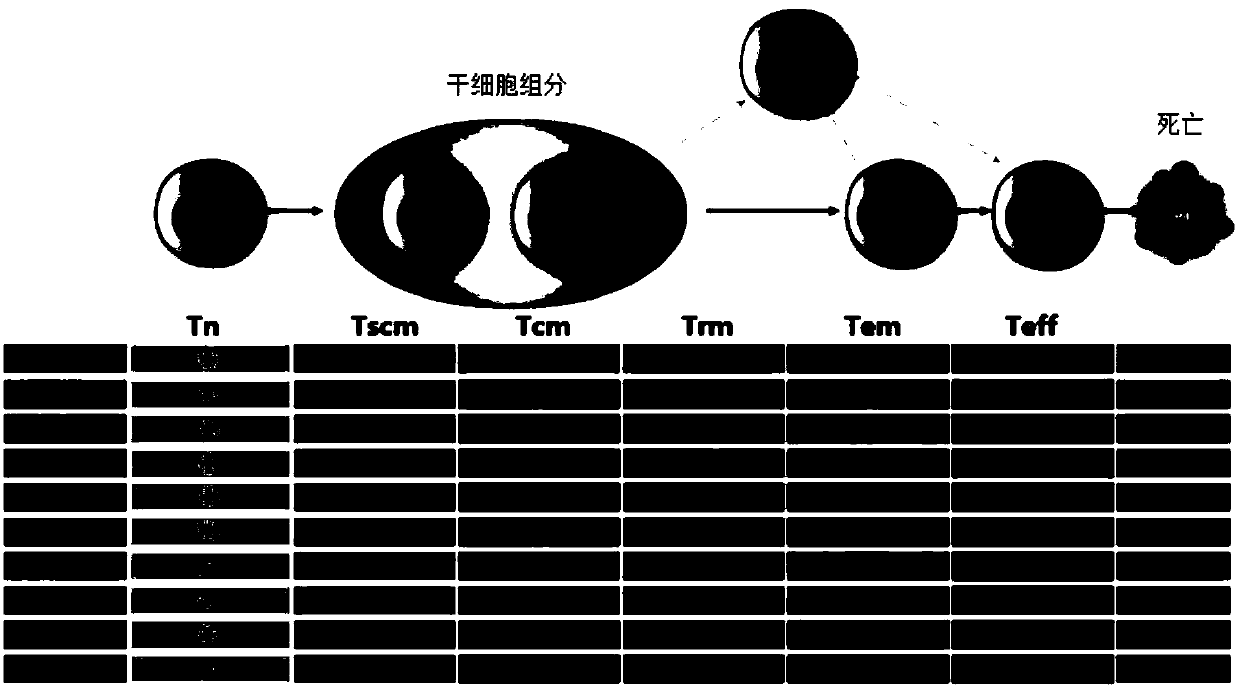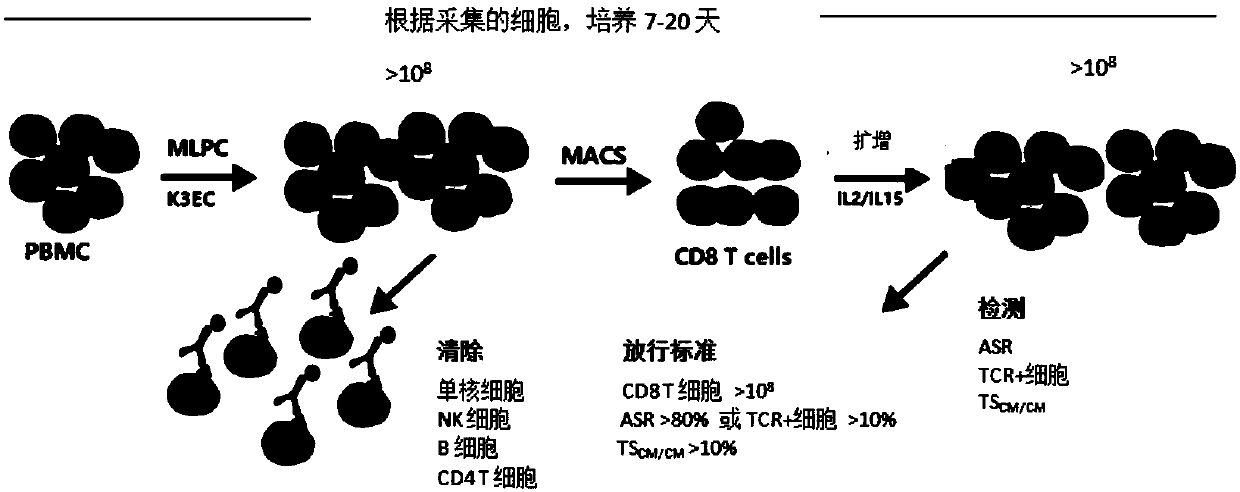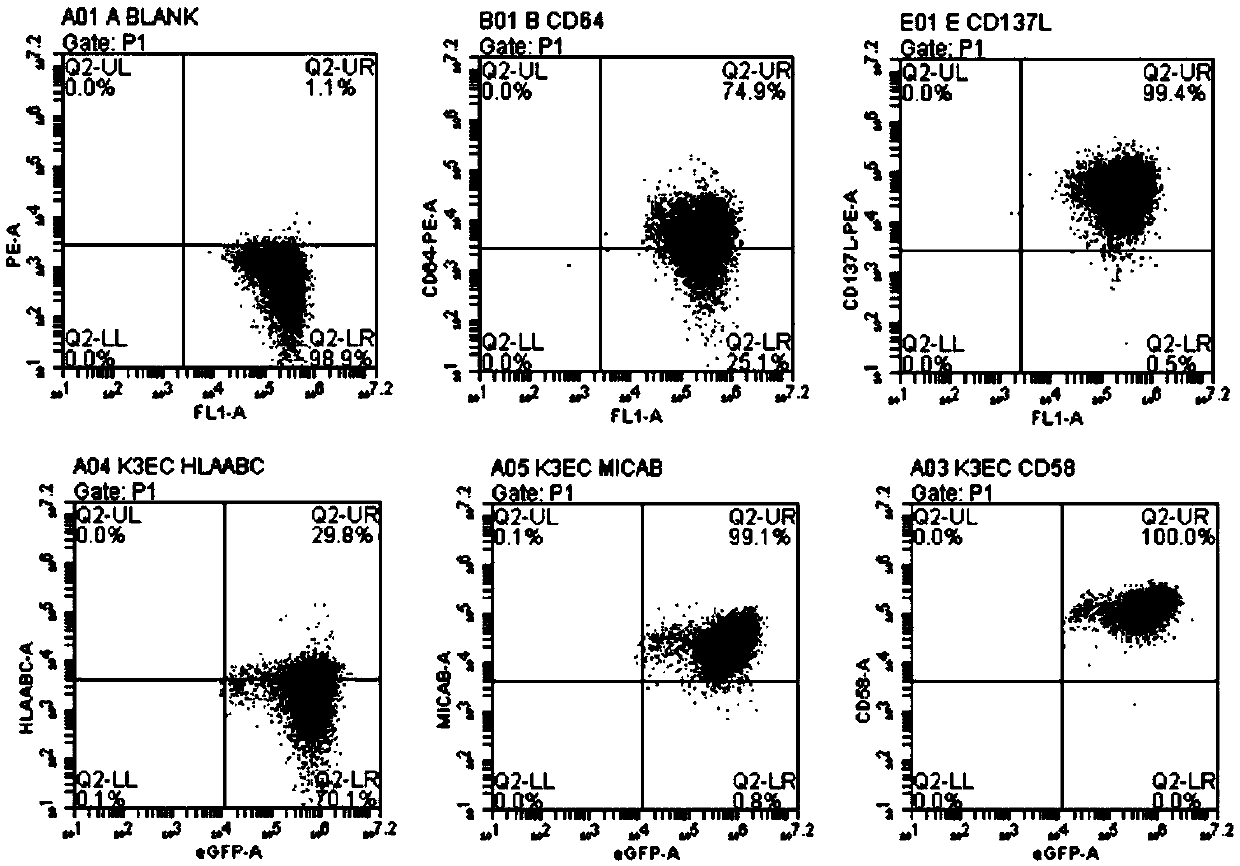Culture expansion method of CD8 T cells, and K3EC cells
A culture method and cell technology, applied in the field of biomedicine, can solve problems such as difficulty and unacceptable for patients, and achieve the effect of efficient preparation
- Summary
- Abstract
- Description
- Claims
- Application Information
AI Technical Summary
Problems solved by technology
Method used
Image
Examples
Embodiment 1
[0066] Example 1 Antigen-specific CD8 T cell preparation process of the present invention ( figure 2 )
[0067] 1. MLPC-plus activates and expands antigen (CMV-pp65)-specific CD8 T cells
[0068] 1) Collect 20ml of peripheral blood and anticoagulate with heparin
[0069] 2) Ficoll gradient centrifugation to collect PBMC, PBS centrifugal washing 3 times
[0070] 3) Resting culture overnight in 10% FCS-RPMI
[0071] 4) After adding 20% K3EC, centrifuge and discard the supernatant, adjust PBMC to 1x 10 with 3% SG-AIM-V 7 / ml
[0072] 5) Add 1 μg / ml CMV-pp65 antigen peptide (Miltenyi, Cat. No. 130-093-435), and incubate at 37°C for 2 hours
[0073] 6) Supplement 3% SG-AIM-V to 4ml, add 4ml 2x CM, culture and passage in 6-well plate
[0074] 7) Collect the cells when culturing for 7 days, adjust the cells to 1x 10 7 / ml
[0075] 8) Add 1 μg / ml CMV-pp65 antigen peptide and incubate at 37°C for 2hr
[0076] 9) Paraformaldehyde fixed K3EC cells
[0077] 10) Adjust cells t...
Embodiment 2
[0086] Embodiment 2 constructs K562-aAPC (K3EC)
[0087] 1. The basis for the selection of co-stimulatory molecules
[0088] The main purpose of constructing K3EC is to provide co-stimulatory signal for MLPC to activate antigen-specific CD8 T cells. It is currently known that the costimulatory signals required to activate such T cells can be provided by multiple receptors, among which CD28 is the most powerful costimulatory receptor. CD28 belongs to the Ig superfamily (Ig superfamily, IgSF), and its cytoplasmic tail contains three motifs: YMNM, TPRRP and PYAP. When CD28 binds to B7 ligand (CD80 / 86), YMNM activates AP1 (activator protein 1), NF-kB (κB nuclear factor) and NFAT (activated T cell nuclear factor) through PI3K-AKT pathway and Grb2-Vav-Sos pathway ) leads to the expression of Bcl-xL anti-apoptotic protein and IL2 cytokine. The PYAP motif can also activate AP1, NF-kB, and NFAT transcription factors through the Grb2-Vav-Sos pathway, while the TPRRP motif mainly acti...
Embodiment 3
[0107] Example 3 Polyclonal T cell proliferation test
[0108] aAPC usually needs to be inactivated (that is, to eliminate the ability to proliferate) before it can be used in T cell co-culture. This inactivation method includes irradiation, mitomycin treatment, and paraformaldehyde fixation. In order to evaluate whether K3EC still has co-stimulatory activity after fixation, CD3 antibody was used to provide polyclonal TCR signal, and 4% paraformaldehyde-fixed K3EC provided co-stimulatory signal. The proliferative activity of T cells was detected by CFSE dilution method, that is, PBMCs were labeled with CFSE (20 μM), and after washing, PBMCs and K3EC were mixed and cultured in 96 wells in different ratios (PBMC:K3EC=5:1, 10:1 and 20:1) In the plate, a CD3 antibody control group was set up at the same time, and 1 μg / ml CD3 antibody was added to each group. CD3 detection after 2 days and 5 days of culture + cells and CD3 + CFSE Low proliferating cells. CD3 + Proliferating c...
PUM
 Login to View More
Login to View More Abstract
Description
Claims
Application Information
 Login to View More
Login to View More - R&D
- Intellectual Property
- Life Sciences
- Materials
- Tech Scout
- Unparalleled Data Quality
- Higher Quality Content
- 60% Fewer Hallucinations
Browse by: Latest US Patents, China's latest patents, Technical Efficacy Thesaurus, Application Domain, Technology Topic, Popular Technical Reports.
© 2025 PatSnap. All rights reserved.Legal|Privacy policy|Modern Slavery Act Transparency Statement|Sitemap|About US| Contact US: help@patsnap.com



